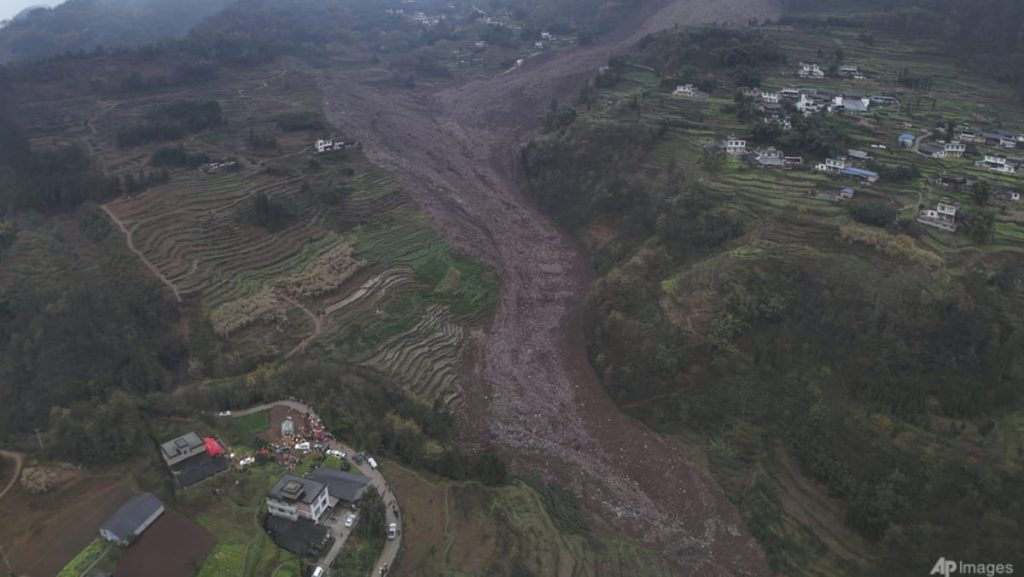Devastating Landslide Strikes China’s Sichuan Province
A tragic landslide occurred in China’s southwestern Sichuan province on Saturday, burying more than 30 people and leaving many others feared dead. The disaster unfolded in Jinping Village, located in the city of Yibin, at approximately 11:50 a.m. local time (3:50 a.m. GMT). State media reported that the landslide was triggered by prolonged and intense rainfall in the region, which has experienced extreme weather conditions in recent months. This event is the latest in a series of climate-related disasters that have plagued China, including deadly floods last year that claimed dozens of lives. Scientists have warned that climate change is exacerbating the frequency and severity of such extreme weather events, making disasters like this landslide more likely in the future.
The Role of Climate Change in Extreme Weather
China has been grappling with the devastating impacts of climate change, as evidenced by the increasing frequency of extreme weather events. Last year, the country experienced its warmest year on record, with floods causing widespread destruction and loss of life. The landslide in Sichuan is a stark reminder of how rising temperatures and altered weather patterns are reshaping the environment. Scientists have pointed out that climate change is not just an abstract concept but a tangible threat that is already manifesting in the form of more intense rainfall, heatwaves, and natural disasters. The prolonged rainfall that led to the landslide in Jinping Village is a clear example of how climate change is disrupting local ecosystems and increasing the vulnerability of communities to such events.
Rescue Efforts and the Struggle to Locate Survivors
Immediately following the landslide, rescue operations were launched to locate and save those buried under the debris. On Saturday, two individuals were successfully rescued, but the search for the remaining victims continues. As of Sunday, 29 people were still reported missing, and local authorities have cautioned that the final number of casualties is still being verified. The rescue efforts have been hindered by the challenging conditions at the site, with rescuers using flashlights to navigate through the dark and treacherous terrain. Video footage broadcast by state media showed the heroic efforts of rescue teams as they combed through the debris, hoping to find any signs of life.
Government Response and Presidential intervention
The Chinese government has swiftly responded to the disaster, with President Xi Jinping issuing a directive on Saturday to prioritize the rescue operations. President Xi emphasized the need to "do everything possible to search for and rescue missing people, minimize casualties, and properly handle the aftermath." This directive underscores the government’s commitment to addressing the crisis and supporting the affected communities. Local authorities in Yibin have been working around the clock to coordinate the rescue efforts and provide assistance to those impacted by the landslide. The government’s response has been praised for its swiftness and resolve, but the scale of the disaster presents a significant challenge.
The Human Toll and Emotional impact
The landslide in Jinping Village has left a trail of devastation, with families and loved ones anxiously awaiting news of their missing relatives. The disappearance of over 30 people has sent shockwaves through the community, as survivors struggle to come to terms with the loss. The emotional toll of such disasters cannot be overstated, as the uncertainty surrounding the fate of the missing creates a sense of helplessness and despair. The rescue teams, comprised of brave and dedicated individuals, are working tirelessly to bring hope to the affected families. Their efforts are a testament to the resilience and solidarity of the human spirit in the face of tragedy.
Moving Forward and Learning from the Disaster
As the rescue operations continue, the landslide in Sichuan serves as a poignant reminder of the need for urgent action to address the root causes of such disasters. Climate change is no longer a distant threat but a harsh reality that requires immediate attention and collective effort. Governments, scientists, and communities must work together to develop strategies that mitigate the impact of extreme weather events and protect vulnerable populations. The lessons learned from this tragedy will be crucial in building a more resilient future for China and the world at large. By understanding the interconnectedness of climate change, geology, and human activity, we can take proactive steps to prevent similar disasters from occurring in the future. The landslide in Jinping Village is a call to action, urging us to prioritize environmental sustainability and safeguard the lives of those most at risk.












